NC AgVentures Chatham County Farm Tour
go.ncsu.edu/readext?965798
en Español / em Português
El inglés es el idioma de control de esta página. En la medida en que haya algún conflicto entre la traducción al inglés y la traducción, el inglés prevalece.
Al hacer clic en el enlace de traducción se activa un servicio de traducción gratuito para convertir la página al español. Al igual que con cualquier traducción por Internet, la conversión no es sensible al contexto y puede que no traduzca el texto en su significado original. NC State Extension no garantiza la exactitud del texto traducido. Por favor, tenga en cuenta que algunas aplicaciones y/o servicios pueden no funcionar como se espera cuando se traducen.
Português
Inglês é o idioma de controle desta página. Na medida que haja algum conflito entre o texto original em Inglês e a tradução, o Inglês prevalece.
Ao clicar no link de tradução, um serviço gratuito de tradução será ativado para converter a página para o Português. Como em qualquer tradução pela internet, a conversão não é sensivel ao contexto e pode não ocorrer a tradução para o significado orginal. O serviço de Extensão da Carolina do Norte (NC State Extension) não garante a exatidão do texto traduzido. Por favor, observe que algumas funções ou serviços podem não funcionar como esperado após a tradução.
English
English is the controlling language of this page. To the extent there is any conflict between the English text and the translation, English controls.
Clicking on the translation link activates a free translation service to convert the page to Spanish. As with any Internet translation, the conversion is not context-sensitive and may not translate the text to its original meaning. NC State Extension does not guarantee the accuracy of the translated text. Please note that some applications and/or services may not function as expected when translated.
Collapse ▲NC AgVentures is a NC State Extension program that provides grants to North Carolina farmers and community groups for new and innovative agricultural project ideas that will increase farm profits. The program is supported by the NC Tobacco Trust Fund Commission.
Each year the AgVentures program selects a county to host a farm tour for representatives from the Tobacco Trust Fund Commission so they can visit some AgVentures Grant recipients. It’s a great opportunity for the funding agency to see first-hand the impact the grants have on these farms. This year Chatham County was selected to host a tour. Horticulture Agent Matt Jones and Sustainable Agriculture Agent Debbie Roos organized an all-day farm tour for the group which included Jeff Camden (Program Officer for the Tobacco Trust Fund Commission), Susan Jakes (Associate State Program Leader CRD, NC State Extension), Jackie Miller (Program Coordinator for the NC AgVentures Grant Program), and Dale Monks (Associate Director and State Program Leader for ANR & CRD, NC State Extension).
It was a great day to showcase some of our innovative farmers and markets and continue to build networks!
Visit the NC AgVentures website to learn more about the grant application program.
Pittsboro Farmers’ Market
The Pittsboro Farmers’ Market received an AgVentures Community Grant in 2023 to make improvements to the market infrastructure. The grant funds were used to purchase a storage shed, solar lights, and gravel to improve the walking surface. Grower Ben Shields of In Good Heart Farm is the President of the Pittsboro Farmers’ Market Board, and he met with the AgVentures visitors to share what the grant had meant for the market and answer questions. Shields had been busy installing the lights and working with volunteers to spread the gravel in the weeks preceding the visit.
The Pittsboro Farmers’ Market is located at The Plant at 220 Lorax Lane in Pittsboro and is open every Thursday from 3:00-6:00 p.m. year-round.
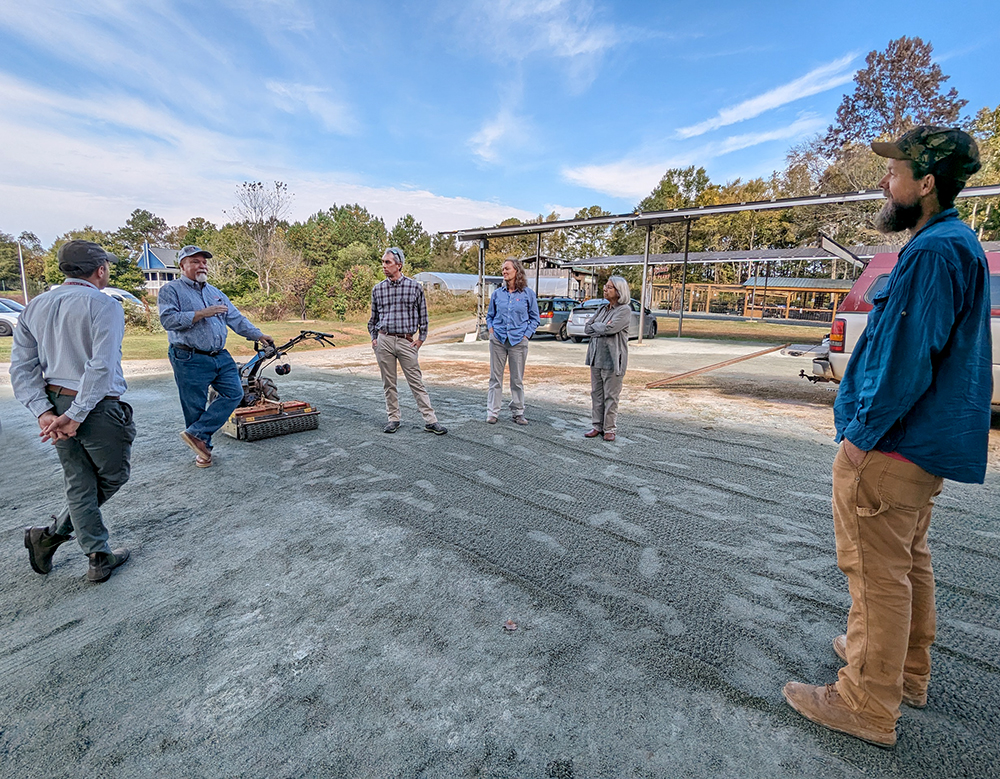
Grower Ben Shields (right) discusses the importance of the improvements with the visitors. You can see the newly spread gravel in the photo. More than one older market customer commented that they were able to start attending market again now that it had an easier walking surface. Photo by Debbie Roos.
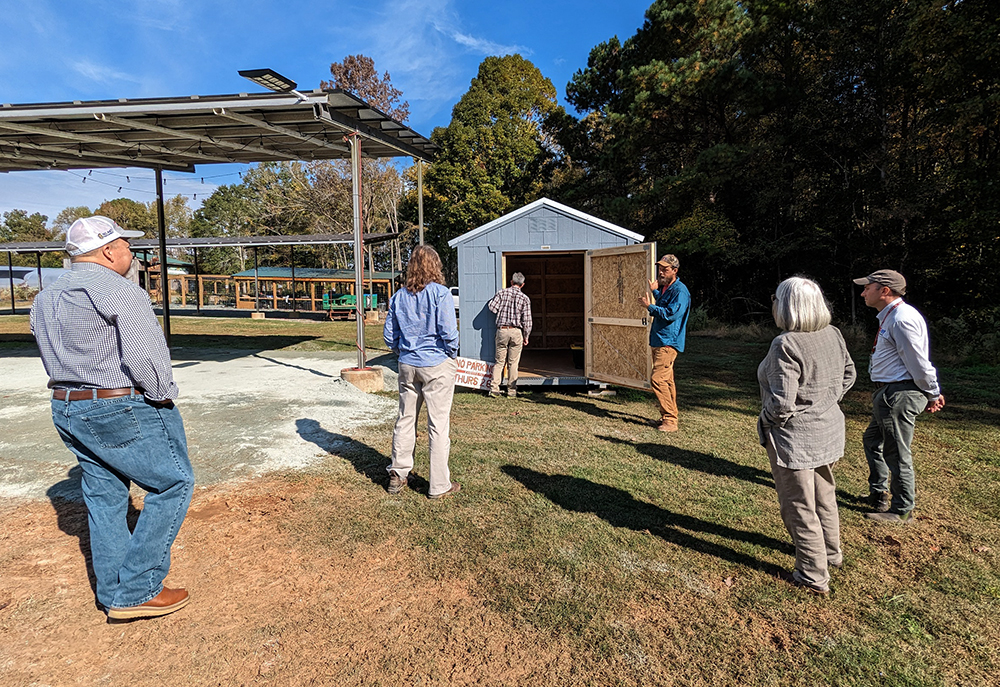
Jeff Camden from the Tobacco Trust Fund Commission checks out the market’s new storage shed. One of the new solar lights is also visible in the photo, peeking out over the edge of the solar panel roof. The lights will be a big help during the shorter days of the winter markets. Photo by Debbie Roos.
Okfuskee Farm
Okfuskee Farm‘s philosophy is a systems approach to farming that demonstrates broad-acre permaculture practices relevant to the piedmont of North Carolina. Farmer and agro-ecological engineer Bobby Tucker explains that “the role of livestock, managed according to their intrinsic values, has always been a part of the farm’s approach to build soil health, control invasive species, diversify woodland and pasture species, terra-form the landscape for water storage, and provide high-quality proteins; the farm includes various ages and types of agroforestry systems comprising 4,000+ trees and shrubs either planted or allowed to regenerate over the past 15 years.” Tucker raises pigs on pasture and also manages a commercial Katahdin sheep flock that has been selectively bred for low-input management and integration with various orchard and agroforestry systems with the goal of balancing ecosystem function, food production, and family quality of life.
Tucker received an AgVentures Farmer Grant in 2021 to purchase sheep handling equipment. “This handling equipment has been instrumental in allowing us to scale our sheep business on leased property while providing for a safe, low-stress environment when working/sorting our animals,” Tucker said. He added that “sheep have become our main farming enterprise as we have found them to provide the most value to our whole operation and quality of life goals; once the right infrastructure and equipment are in place, a pasture-based livestock system can be very scalable, profitable, and compatible with our mission to improve ecological function on the lands we manage.”
If you are interested in purchasing Okfuskee Farm pastured pork or lamb contact Bobby Tucker.
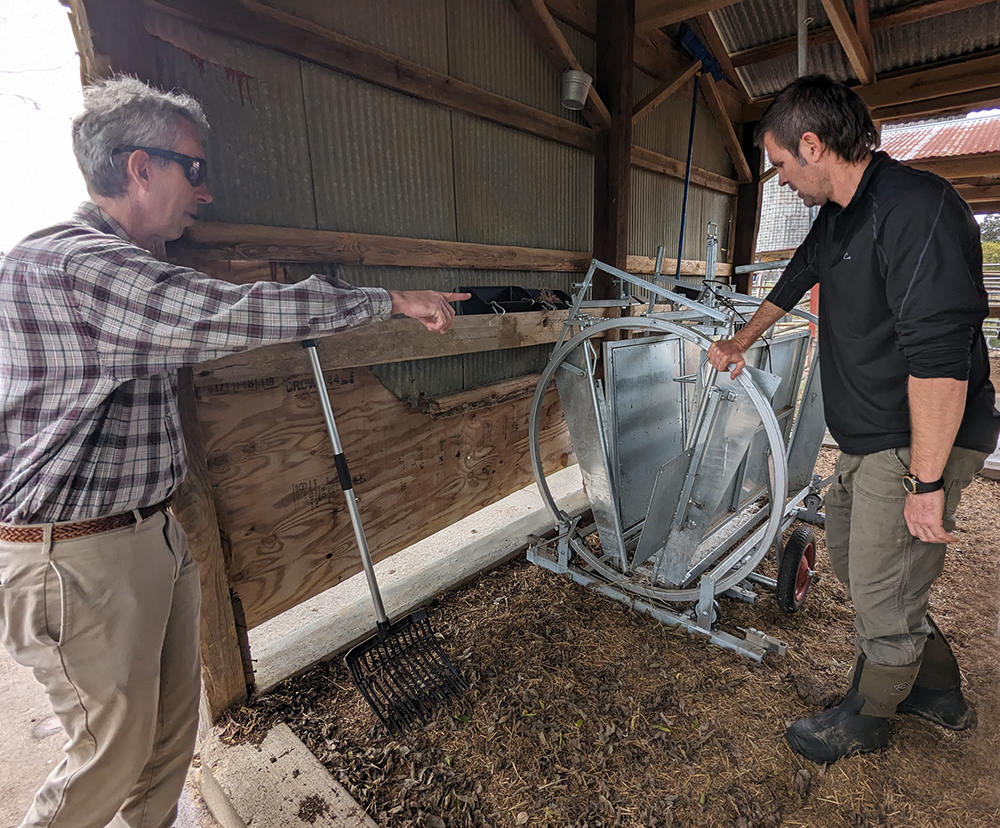
Jeff Camden from the Tobacco Trust Fund Commission talks with Bobby about a piece of sheep handling equipment he purchased with AgVentures grant funds. The “Roll O’matic” work table and scale is great for vaccinating and hoof trimming. Photo by Debbie Roos.
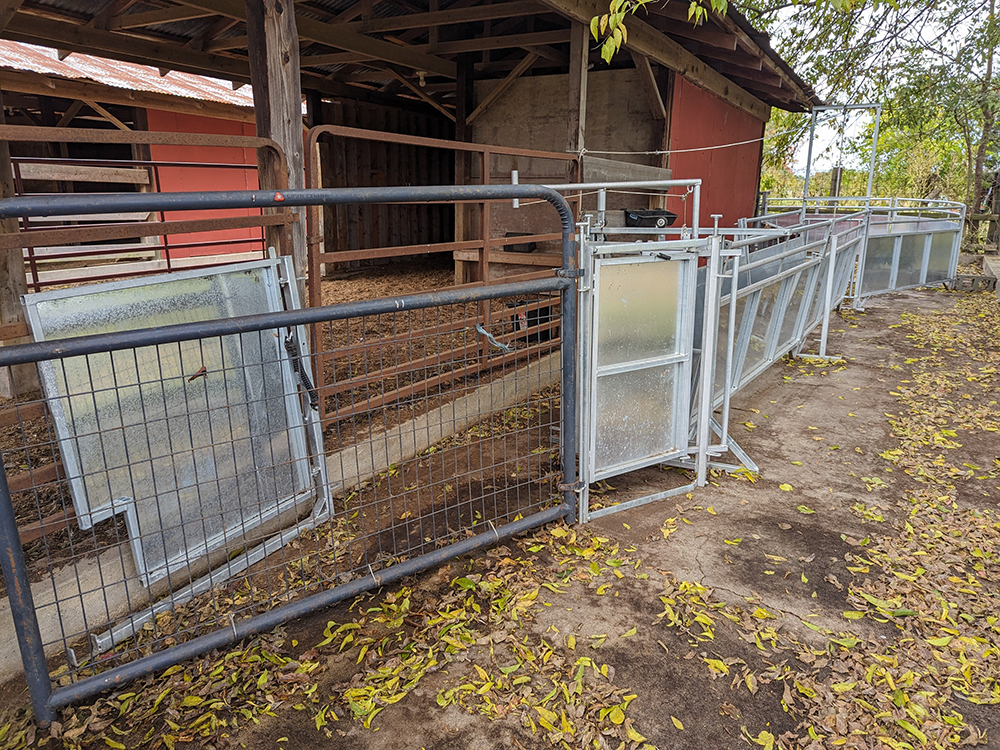
More sheep handling equipment paid for with AgVentures grant funds. Bobby is leasing this land for his sheep flock and set up the equipment in the old dairy barns. Photo by Debbie Roos.
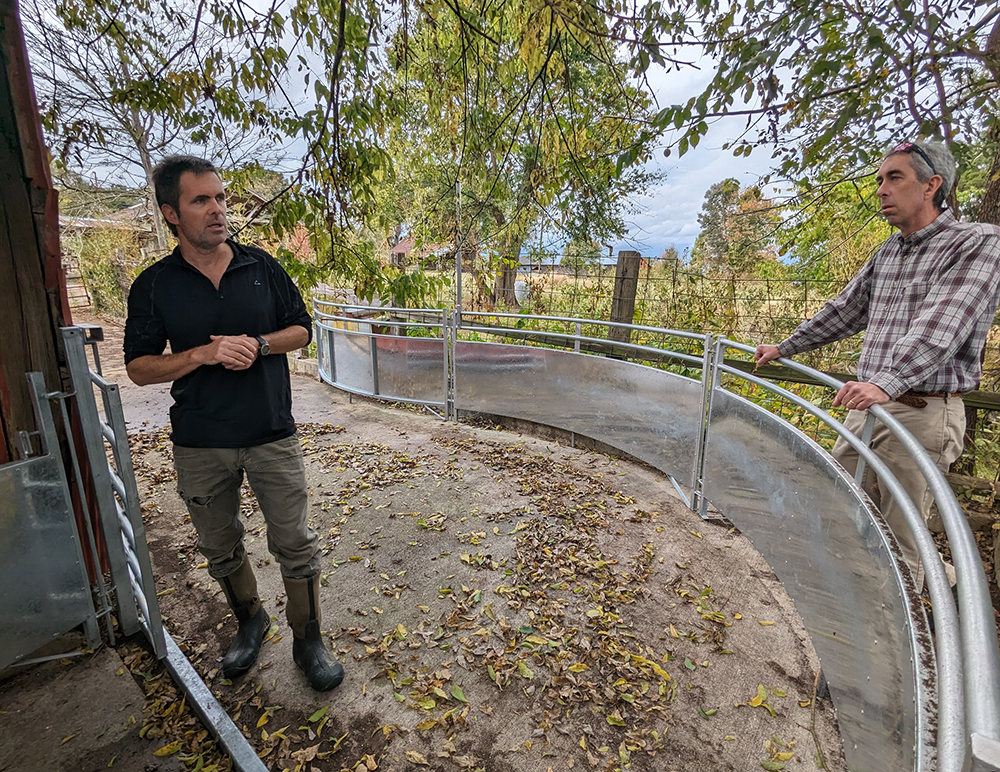
These panels are used for sorting and working sheep. Bobby is breeding for a hardy parasite-resistant commercial Katahdin flock for a low-input system. Photo by Debbie Roos.
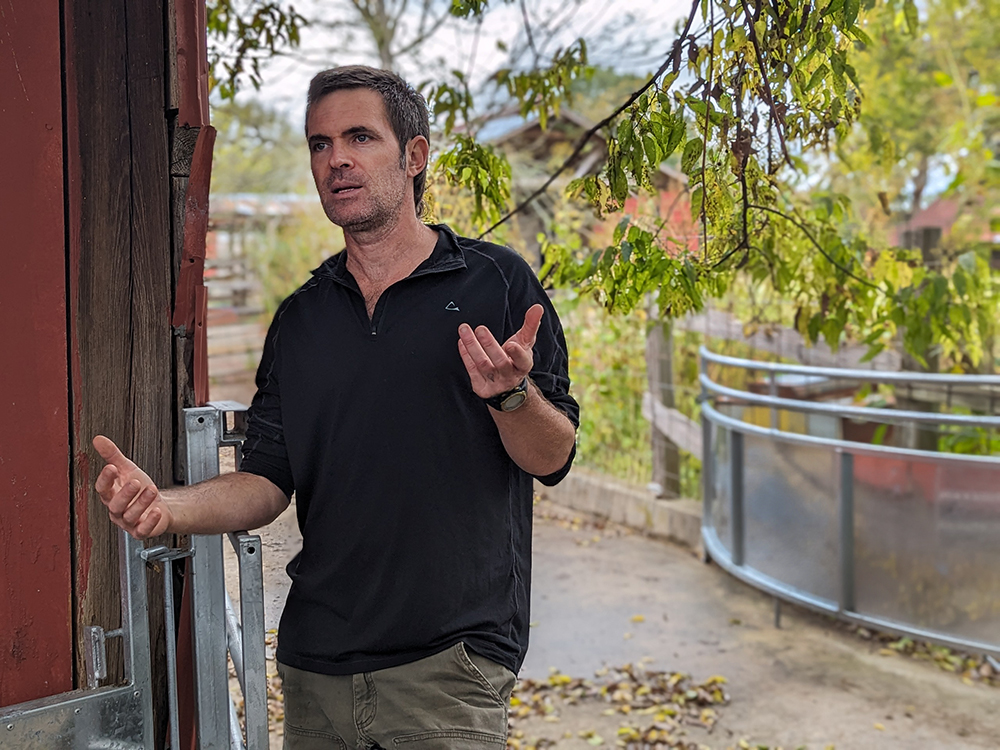
Bobby Tucker of Okfuskee Farm. Photo by Debbie Roos.
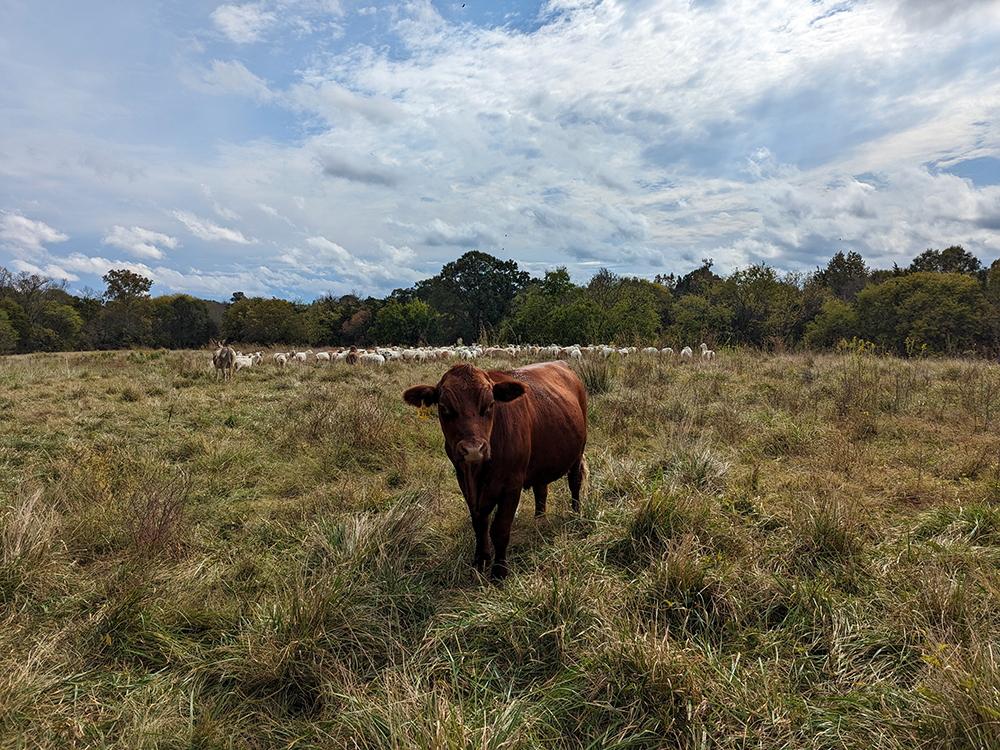
A few South Poll cattle graze with the Katahdin sheep flock. Photo by Debbie Roos.
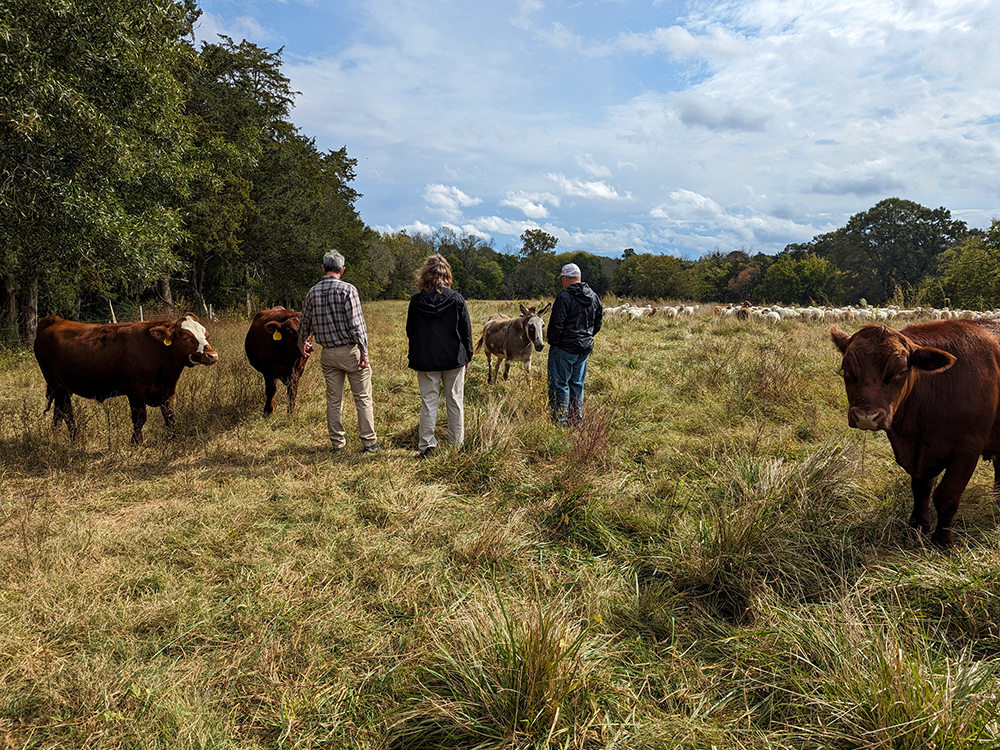
Jeff, Susan, and Dale mingle with the cattle, donkey, and sheep at Okfuskee Farm. Photo by Debbie Roos.
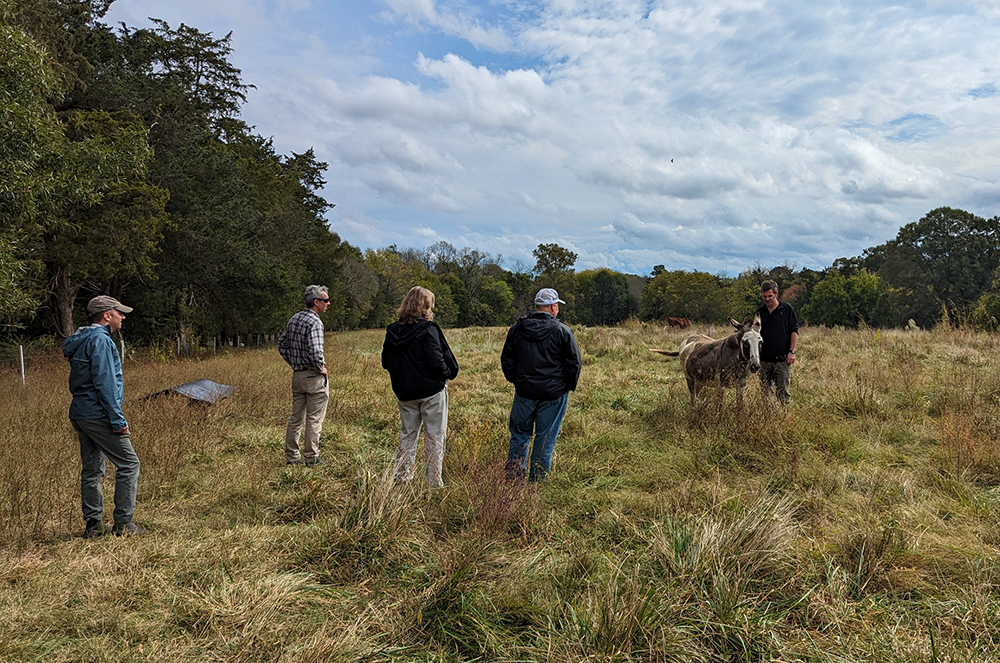
Matt, Jeff, Susan, Dale, and Bobby with Zoe the donkey. Photo by Debbie Roos.
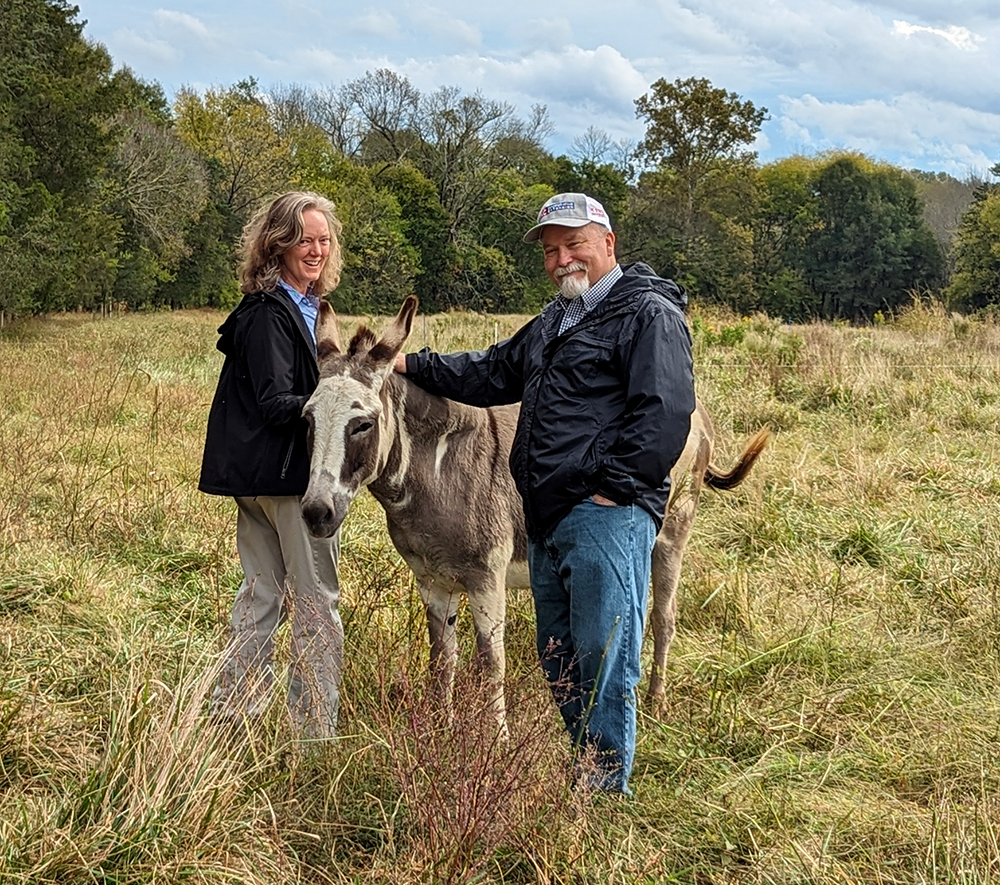
Susan and Dale with Zoe the guardian donkey. Photo by Debbie Roos.
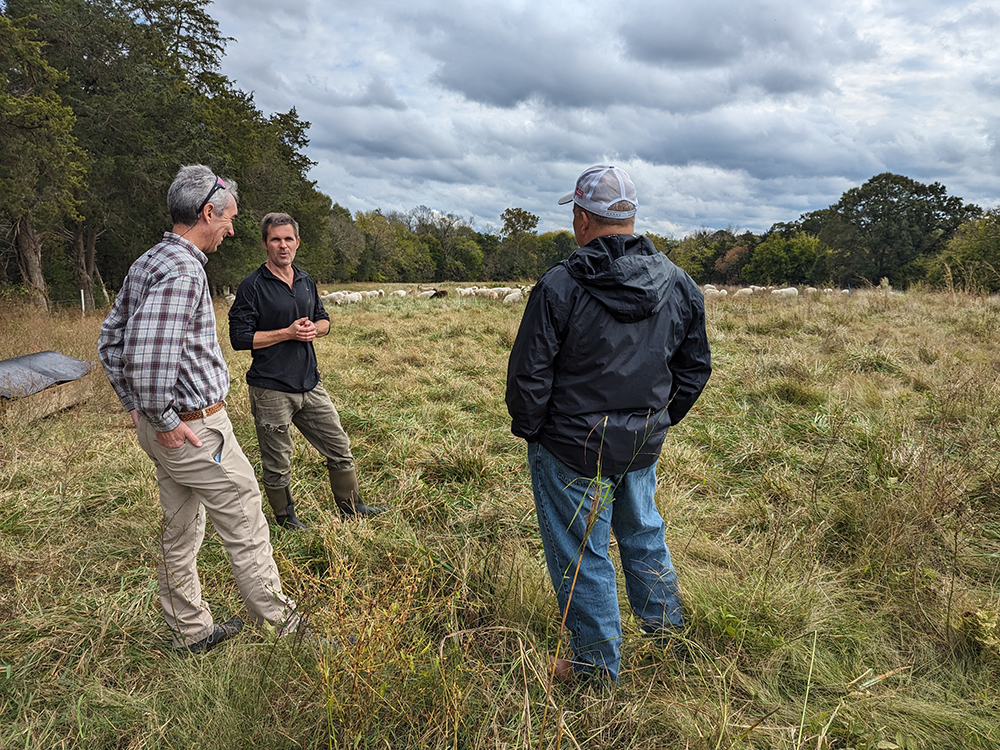
Jeff, Bobby, and Dale discuss farming with the sheep flock in the background. Photo by Debbie Roos.
Dutch Buffalo Farm
Farrell Moose grows native perennials, trees, and shrubs at Dutch Buffalo Farm in Pittsboro. Moose and his wife Emily started out as vegetable growers in 2007, marketing through community supported agriculture (CSA) and the local farmers’ market for 10 years. Moose received an AgVentures grant in 2020 and said he is grateful for the grant because it helped fund the infrastructure to transition his farm from vegetable production to native plant propagation where he sees many opportunities due to the high demand state-wide for native plants.
The AgVentures grant helped to fund Dutch Buffalo Farm’s innovative tobacco float propagation system. This system provides two primary benefits: 1) it allows Moose to propagate more than three times the volume of native plants in the same amount of space as traditional propagation methods and 2) the cool water temperatures of the float system in the spring allow him to achieve the cold stratification required for seed germination at scale.
Dutch Buffalo Farm has quickly built a strong customer base of gardeners, landscapers, and restoration professionals. They also sell wholesale to other nurseries. Visit the Dutch Buffalo Farm website for more information and to order plants.
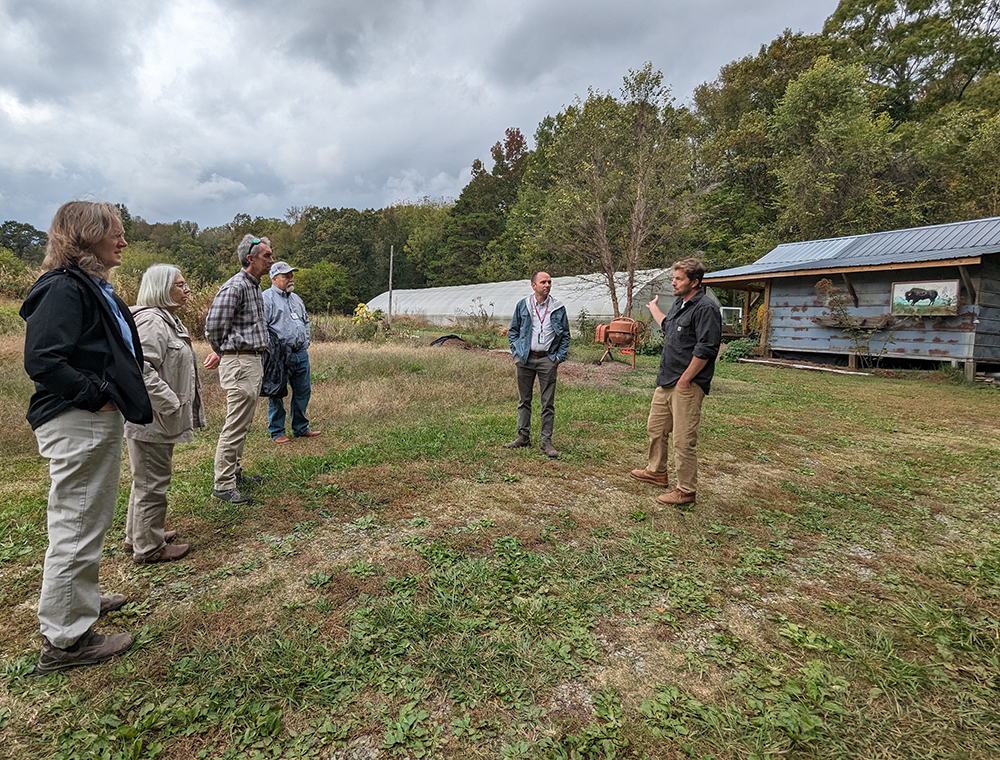
Grower Farrell Moose of Dutch Buffalo Farm explains how the AgVentures grant helped fund the transition of his farm from vegetable production to native plant propagation. Photo by Debbie Roos.
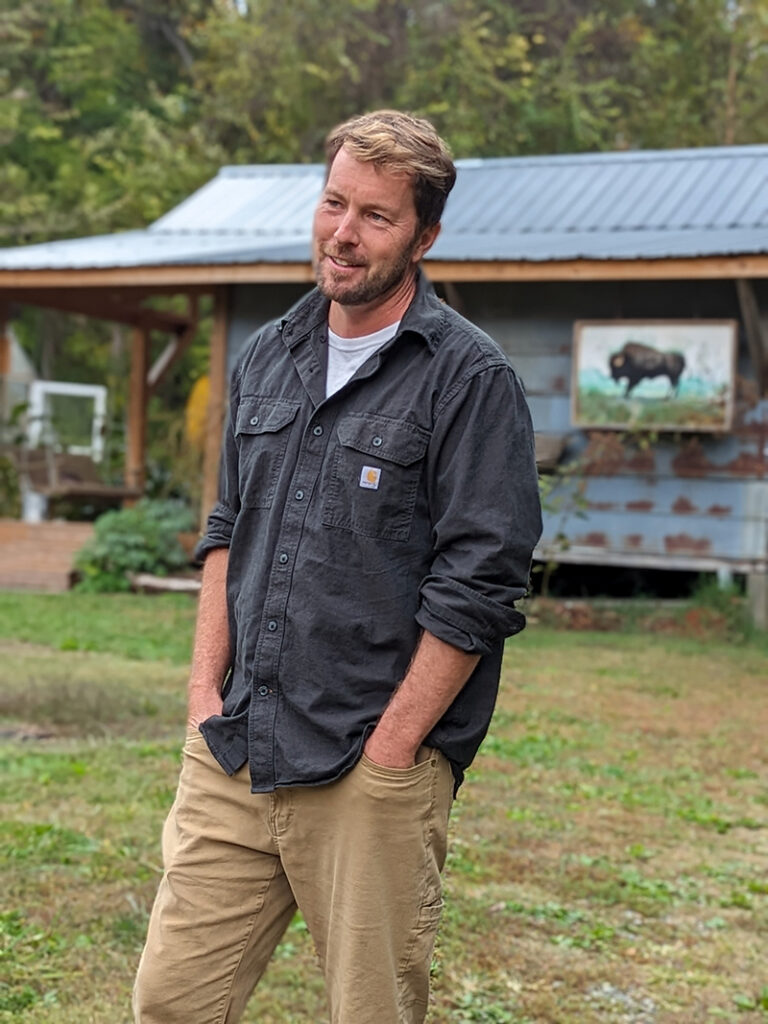
Grower Farrell Moose of Dutch Buffalo Farm. Photo by Debbie Roos.
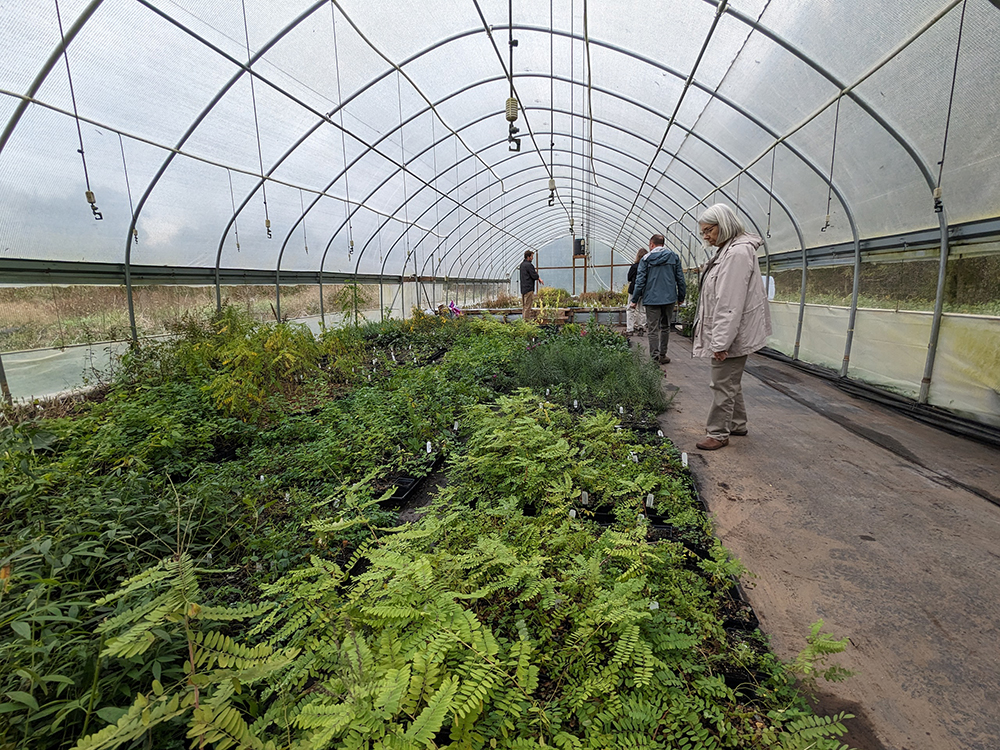
Heading into the high tunnel at Dutch Buffalo Farm. Photo by Debbie Roos.
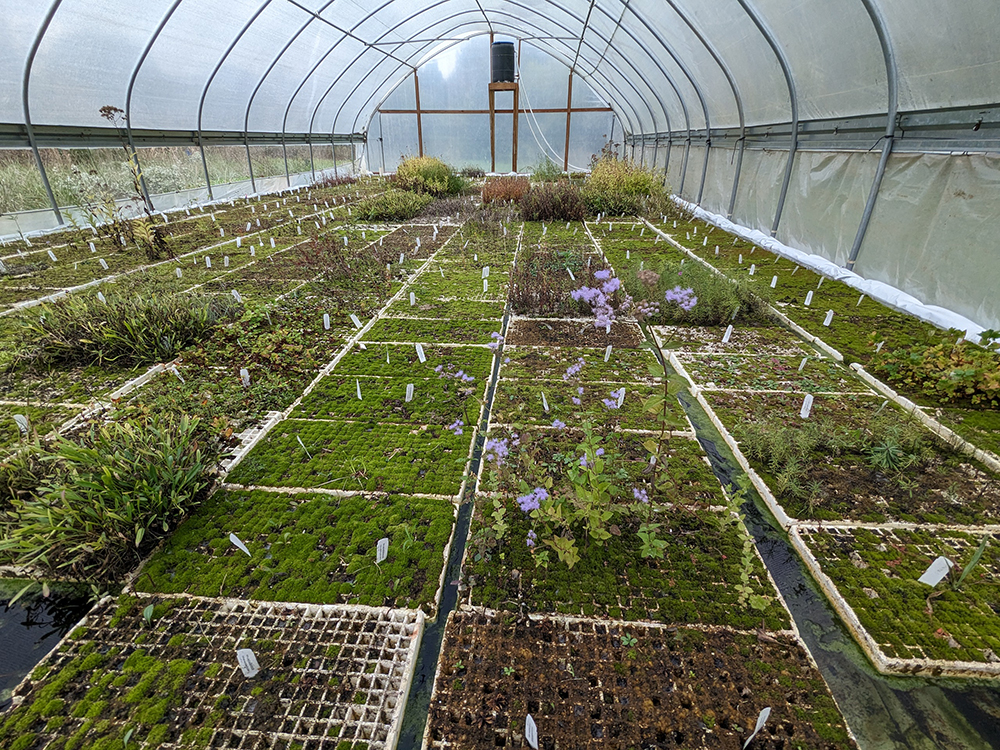
Farrell utilizes a repurposed tobacco float system to propagate plants. These styrofoam trays are floating on about two feet of water. The cool water temperature helps with cold stratification of the seeds (required for germination) on a large scale. He seeds directly into the small cells; the plants stay small in the cells and are potted up on demand. Photo by Debbie Roos.
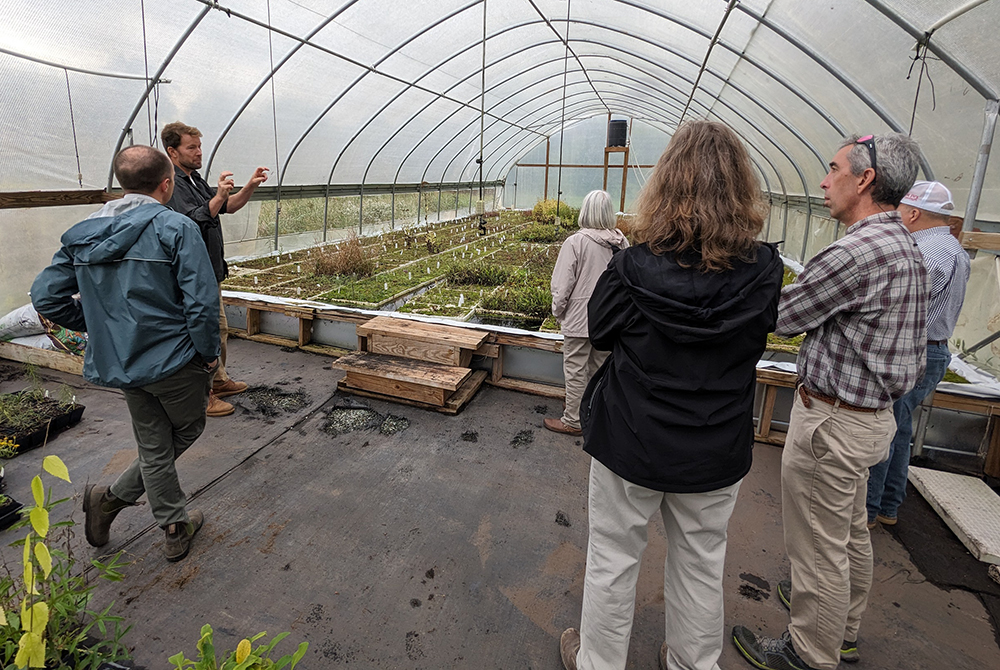
Plants in the float system can be held longer and at a lower cost than in a traditional nursery propagation system. By controlling the temperature, fertility, and oxygenation of the water, Farrell can control the growth rate of the plants in the float system to respond to changes in market demand. The float system provides flexibility for the nursery since they are only potting up plants as they are purchased. Photo by Debbie Roos.
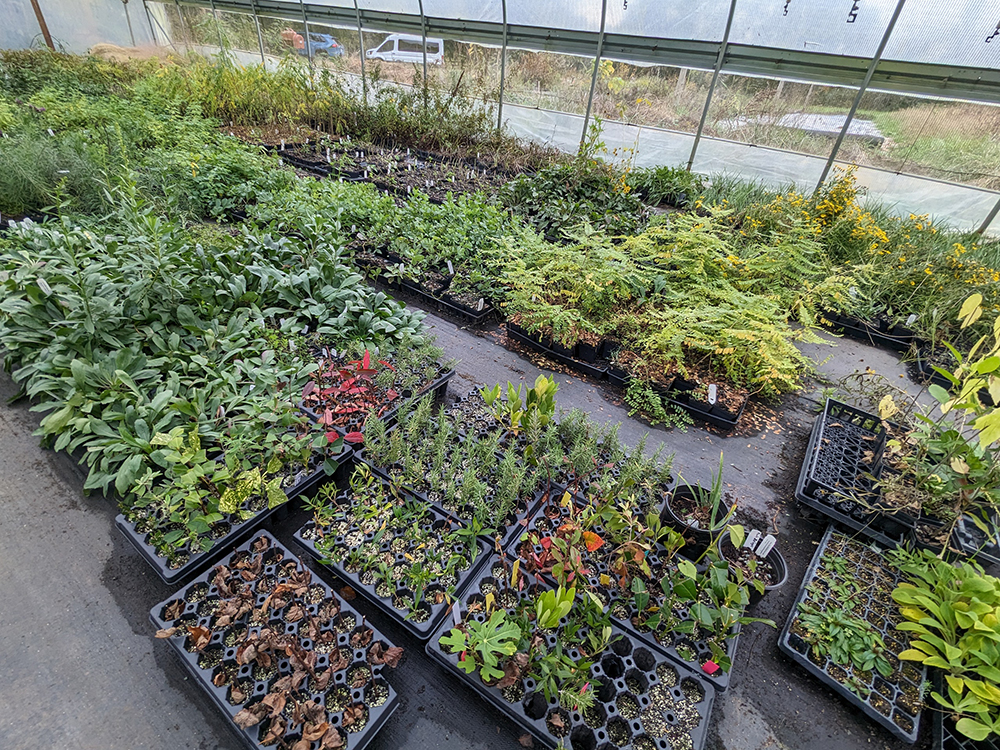
Dutch Buffalo Farm grows over 80 species of native wildflowers, most grown from responsibly wild-collected seed. Photo by Debbie Roos.
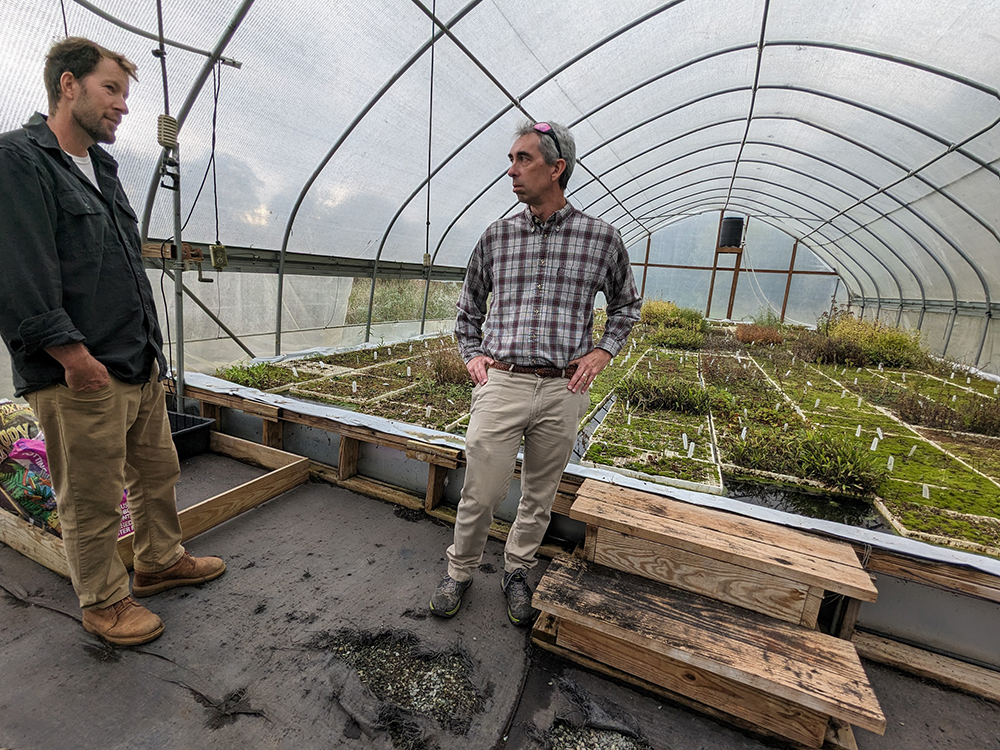
Because Farrell is able to control fertility and hold plants longer or replant based on actual market demand using the tobacco float system, he is able to avoid losses and limit the amount of resources that go into unsold nursery stock. Photo by Debbie Roos.


